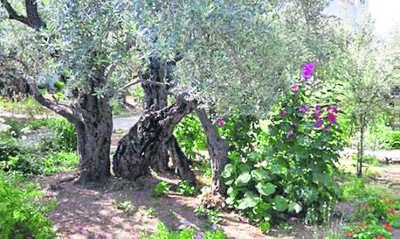Peter’s denial of his Lord is recorded in all four Gospels, and to have the full picture we need to take into account the details given in each account. It is remarkable that all four evangelists record this denial, because when the Gospels were written Peter was a leading apostle, one of the chief men in the church. The intention of the evangelists is not to denigrate or belittle Peter, for Peter had repented, had been reinstated, and remained in a position of trusted leadership. It was good for the church to be aware that its leaders were fallible sinners; to know that Peter had had a dreadful fall but, by God’s grace, had been restored.
The reasons for Peter’s denial
How do we account for his conduct? Would we have expected Peter, of all people, to behave in such a manner? Perhaps the answer to that is ‘Yes’ and ‘No’. ‘No’ because of his passionate avowal of loyalty to his Lord and ‘Yes’ because he was impetuous by nature. But there were other factors that contributed to his fall.
Forgetfulness
Firstly, he was forgetful of Christ’s clear warning. When Peter insisted that he would never be offended because of his Lord, Christ had replied, ‘Verily I say unto thee, that this day, even in this night, before the cock crow twice, thou shalt deny me thrice’. How did Peter react? ‘He spake the more vehemently, if I should die with thee, I will not deny thee in any wise’ (Mark 14:29-31). Not only had Peter forgotten Christ’s warning, but also the explosive protest that he made at the time showed he had virtually rejected the warning! Indeed, so insensitive was he to this stern warning that the first time the cock crowed he took no notice. The cock’s loud crowing aroused no introspection in Peter’s soul.

Fear
Another factor in Peter’s denial was fear. He, a follower of the Lamb, a man of God, was surrounded by Christ’s enemies. When we read the various accounts, we see that Peter did all the things Psalm 1 says a godly man should not do! First he stood in the company of the ungodly (John 18:18) and then he ‘sat in the midst of them’ (Luke 22: 55-56). He stood in the way of sinners and sat in the seat of the scornful. His fear was heightened when a man related to Malchus, whose ear he had struck off at the time of Christ’s arrest, approached him and said, ‘Did not I see thee in the garden with him?’ (John 18:26). It was then that Peter made his final denial. Peter had fallen. Peter had trusted too much in Peter, when he should not have trusted in Peter at all!
The nature of Peter’s denial
Essentially, he had disowned Christ. In spirit he had cut himself off from Christ. It is always a serious matter to swear an oath needlessly or lightly. Casual swearing shows that the speaker has no sense of awe or dread at the mention of God’s name. In Peter’s case, his reckless swearing as he denied his Lord meant that he disclaimed all share in the blessings and salvation which Christ procures. He crucified Christ in his heart – crucified and buried him as Lord and Master. The force and intent of Peter’s oath was such that he virtually called upon God to punish him if what he said was not true.
As we listen to Peter we cannot conceive of a more thorough repudiation of Christ. What now of his vow, ‘Although all shall be offended, yet will not I’? At that moment, if Christ had taken Peter at his word, he was damned.

But Peter was Christ’s child, given to him by the Father from all eternity, and Christ saw beyond Peter’s faithlessness, disloyalty and defeat. The Lord had prayed for him, as he had promised, that his faith should not fail or be destroyed (Luke 22:32).
The consequences of Peter’s denial
When discussing this incident, most commentators and preachers concentrate their thoughts on Peter, and only mention Christ indirectly noting that he turned and looked at Peter. They rightly underline the effect of that look, but fail to note the effect of Peter’s oaths and curses on Christ!
This is a serious oversight. Shortly before his arrest, when he foretold that Peter would deny him thrice that very night (Mark 14:27f), Christ had quoted from Zechariah 13:7. ‘Awake, O sword, against my shepherd, and against the man that is my fellow, saith the Lord of hosts: smite the shepherd, and the sheep shall be scattered…’ Christ’s isolation and forsakenness were ordained by God.
No part of Christ’s suffering was accidental. God is aggravating Christ’s suffering as Peter’s curses fall from his lips and as Peter treats the Master as a total stranger. ‘I know not the man. He is nothing to me. I have nothing whatever to do with him. Please don’t associate me with him!’
Do we ever think of the pain Peter’s denial caused the Lord? He is friendless and forsaken, and that according to the sovereign will of God. Again we see the mystery of divine sovereignty and human responsibility. It is there in all that Christ endured. We see that mystery in focus in Acts 2:23: ‘Him, being delivered by the determinate counsel and foreknowledge of God, ye have taken, and by wicked hands have crucified and slain’. Don’t try to understand this; just believe it.
Peter’s words of denial added to the sorrow and pain of the Forsaken One as he stood before the high priest. Which, we may ask, caused Christ the most pain: Judas’ kiss of betrayal in the garden or Peter’s persistent denial of his Lord?

Crushed
The second consequence of Peter’s denial concerned himself. He ignored the first crowing of the cock. But not so when it crowed the second time. Apparently, the cocks in that area crowed at three distinct times: half-an-hour after midnight, about an hour later, and then another hour later. Each period of crowing lasted some three to five minutes.
As Peter heard the second cockcrow, all his curses turned in on him and crushed him with a terrible, unspeakable grief. Why? There was nothing different or special about the rooster’s crow the second time. Matthew says the cock crew and ‘Peter remembered the word of Jesus… and he went out and wept bitterly’. Mark says much the same. Why, then, did Peter remember Christ’s words at the second cockcrow and not at the first?
The look of Christ
We find the answer in Luke’s account. ‘While he yet spake, the cock crew. And the Lord turned, and looked upon Peter. And Peter remembered the word of the Lord … and Peter went out and wept bitterly’ (22:60-62). The reason why Peter remembered as the cock crew for the second time was the look which the Saviour gave him at that moment. The crowing of the cock and Christ’s look coincided in providence – and Christ looked right into Peter’s soul with infinite sorrow and infinite love.
In that moment Christ is lavishing all his love and all his energy on Peter. ‘Satan, you may sift him as wheat, as you asked, but you won’t win; you can’t have him; he is mine from all eternity – everlastingly mine’. And Satan lost. Peter wept hot tears of repentance (the word used in Matthew 26:75 means ‘to wail’). And God put those tears in his bottle (Psalm 56) and Peter was forgiven, ‘converted’, and made ready to strengthen his brethren.

Christ’s intercession
Only a Christian can deny his Lord. The sin of a backsliding believer must not be confused with the denial of persistent unbelief. Christ said, ‘Whosoever shall confess me before men, him shall the Son of man also confess before the angels of God: but he that denieth me before men shall be denied before the angels of God’ (Luke 12: 8-9). Such persistent denial is the mark of the reprobate.
Yet how easily, as Christians, we forget God’s warnings as, by word or action or silence, we deny our Lord! There is much comfort in knowing that the Christ who prayed for Peter prays continually for all his people. His intercession is constant. Without that intercession, Satan would have his way with us. Aware of our frailty, the poet puts words into Peter’s mouth.
O Christian sinner, fallen in the way, come see
A guilt incomparable in me,
And see the love in the Redeemer’s face
For every penitent who trusts his grace;
I feel the former fevers burn,
The ancient fires now return;
Defying envy, might, and sword
Danger and death, I seek my Lord
That he, though bound, may set me free.
Now Christ, no longer bound, still sets us free. It has been well said that God’s Spirit has given us this fourfold account of the fall and restoration of one of his most eminent servants, ‘so that all may fear, none may presume, and all may hope’.






